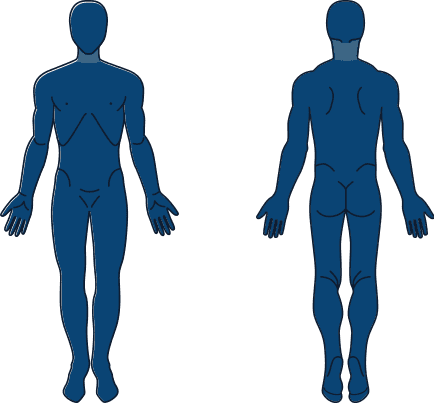What is a concussion?
- A concussion is an injury to the brain in which the normal function of the brain is temporarily disturbed. Concussions are sometimes referred to as mild traumatic brain injuries (MTBI).
What are some of the typical causes of concussions?
- Concussions are caused by impacts and or rotational forces to the head that are transmitted to the brain leading to brain or nerve fiber tissue damage.
- Sports in which concussions most commonly occur include football, ice hockey, gymnastics, combat sports, lacrosse, and soccer. Non-sport occurrences include motor vehicle accidents and work injuries.
- Concussions can occur in any sport or activity where there is impact to the head.
What are the symptoms of concussions?
- Symptoms of concussion are grouped into four categories: physical, cognitive, emotional, and sleep.
- Physical symptoms include: headache, nausea, vomiting, balance problems, dizziness, vision problems, light/noise sensitivity.
- Cognitive symptoms include: feeling foggy, feeling slowed down, difficulty concentrating, memory problems.
- Emotional symptoms include: irritability, sadness, increased emotions, nervousness
- Sleep symptoms include: sleeping more or less than usual, drowsiness, trouble falling or staying asleep.
What are some initial treatments?
- REST, REST, REST, REST
- Rest initially typically includes both physical and cognitive activity.
- Suspected concussions should be evaluated by a healthcare provider.
What is a neck strain/sprain?
- A neck strain is a forceful stretching tearing of the small muscles or tendons that run close to the bones in the neck or of the larger neck muscles that can be felt through the skin.
- A neck sprain is a forceful stretching or partial tearing of the ligaments that connect the bones of the neck.
What are some of the typical causes of neck strains/sprains?
- The most common causes are forced movements of the head and neck, as in whiplash injuries or in contact sports.
- Other common causes include being in an awkward position for prolonged periods (sleeping, computer/smart phone use)
What are some initial treatments?
- Rest – Avoid painful positions, you may have to change your sleeping position/pillow
- Ice – 15-20 minutes every 3-4 hours for a few days
- Over the counter medication – acetaminophen (Tylenol), ibuprofen, or naproxen (Aleve) for the first few days may be helpful (do not take for more than 7 days without discussing with your healthcare provider).
- Heat – After the first few days alternating heat and cold or using heat exclusively may be helpful
Swimmer’s Ear (Otitis Externa)
What is swimmer’s ear?
- Swimmer’s ear or otitis externa, is an inflammation or infection of the ear canal.
- It is more common in athletes who participate in water sports or when the ear canal remains moist because of sweat running into the ear.
What are some of the typical causes of swimmer’s ear?
- The most common cause of swimmer’s ear is a bacterial infection.
- Fungal infections are the second most common cause andmay occur after treatment of bacterial infections.
- Yeast infections are less common and may be associated with hearing aid use.
What are the symptoms of swimmer’s ear?
- Ear Pain, itching, ear discharge, hearing loss, and crusting around the ear canal opening are common symptoms of swimmer’s ear.
What are some initial treatments?
- It is recommended to seek care from your healthcare provider if you suspect you may have swimmer’s ear.
- Keep water out of your ears.
- Avoid placing objects (q-tips, ear buds, etc) into your ear canal.
What is a neck stinger?
- A stinger is an injury to the nerves that travel from the neck into the shoulder and arm.
What are some of the typical causes of neck stinger’s?
- A neck stinger is typically caused by forced compression or forced stretching of the neck to the side.
What are the symptoms of neck stinger’s?
- Pain from the neck down the arm
- Burning, pins & needles sensation
- Arm weakness
What are some initial treatments?
- Rest, Ice to neck, Anti-inflammatory medication
